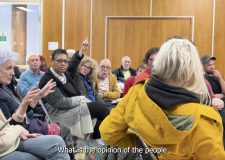Tougher licensing rules for Brighton and Hove clear first hurdle
Licensing rules should be tightened up across a wide area of Brighton and Hove, according to a committee of councillors.
They voted narrowly in favour of the tougher regime this afternoon after a single Conservative – Patcham councillor Carol Theobald – supported the Greens.
They also voted for tougher rules to govern the granting of new licences for late-night takeaways and off-licences, night clubs and super pubs in the centre of Brighton and Hove.
They believe that a more favourable set of rules should be applied to restaurants, traditional pubs and venues such as theatres and cinemas.
And while central Brighton and Hove may be treated as a special case in licensing law, councillors voted in favour of a much more relaxed policy at Brighton Marina.
Their verdict will be reported to a meeting of all the councillors belonging to Brighton and Hove City Council where a further lively debate is expected.
The debate revolves around two policies aimed at tackling noise nuisance, crime and rowdy behaviour associated with people drinking too much.
The first policy involves tougher rules for a designated part of the city known as the cumulative impact area or cumulative impact zone.
Extensive
West Street is at the heart of this area although the area is much more extensive than just the one street.
Anyone applying for a licence to sell alcohol in the cumulative impact area has to show that drink-related problems will not be made worse by their application.
The original cumulative impact area was designated three years ago. Councillors believed that the number of pubs, clubs, off-licences and other premises selling alcohol had reached saturation point within the area.
Licensing law permits them to take into account the cumulative impact of granting further licences in the area rather than treating each application solely on its own merits.
This afternoon they voted to extend the cumulative area significantly to stretch from Holland Road in Hove to Upper Rock gardens and Lower Rock Gardens in Kemp Town.
It would run along Western Road, up Queen’s Road and Surrey Street to Brighton Station, down Trafalgar Street to St Peter’s Church and along Edward Street.
The second policy involves a matrix of types of neighbourhood and types of venue. It differentiates between residential and commercial, for example, and between pubs, clubs, restaurants, takeaways, off-licences and theatres.
The matrix would give more encouragement to pubs and restaurants and less to late-night takeaways and super pubs full of people standing up and drinking.
Concerns
Six Green councillors supported the extended cumulative impact area along with Councillor Theobald. They also backed the creation of a “special stress area” where the rules are tougher than usual but not as tough as in the cumulative impact area.
Councillor Dee Simson, who represents Woodingdean for the Conservatives, said: “I have concerns about the possibility of legal challenge.
“I have concerns about the policing if this extends to half the city.
“And most importantly I have concerns about the expectations of our residents. Many of them have been getting the wrong message thanks to inaccurate media reports that no more licences will be granted.
“We know that’s not the case.
“I also have concerns about businesses at a time when so many young people are unemployed.
“Many young people get their first job in the leisure industry, in bars and restaurants.”
Robust
Councillor Jason Kitcat, who represents Regency ward for the Greens, where many of Brighton’s main venues can be found, said: “We can never rule out the possibility of a challenge from an enterprising lawyer.
“The way in which Sainsbury’s was so completely rebuffed (by a court) shows that the policy is robust.
“We are a very special case.
“In Regency residents have taken heart that they can win. It’s made a real difference to people’s lives.
“People are making objections (to licence applications) now because they know that they will be listened to.
“Using the recession as a reason not to adopt this is wrong. We’ve seen bankruptcies in West Street (under the existing regime).”
He said that the original cumulative impact area was too modest in size and scope, adding: “The border should cover the proper heart of the night-time economy.”
Councillor Mo Marsh, who represents Moulsecoomb and Bevendean for Labour, said: “The alcohol problem in the city goes much wider than licensing but we do have some tools in the toolbox.
“None of what we do will prevent people from pre-loading where they have drink at home before they go out.”
She warned of the dangers of “diluting” the cumulative impact area by extending it, saying that it was already too big.
A comfortable majority of councillors approved the proposed matrix. Again a final decision will be made by the full council at a future meeting.




















